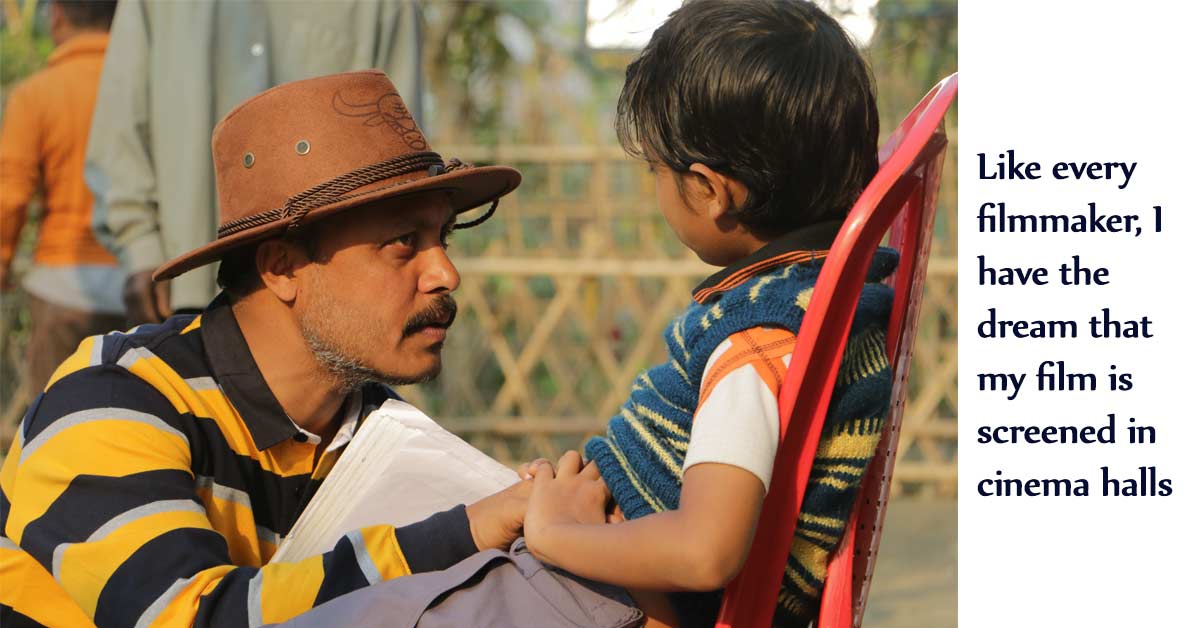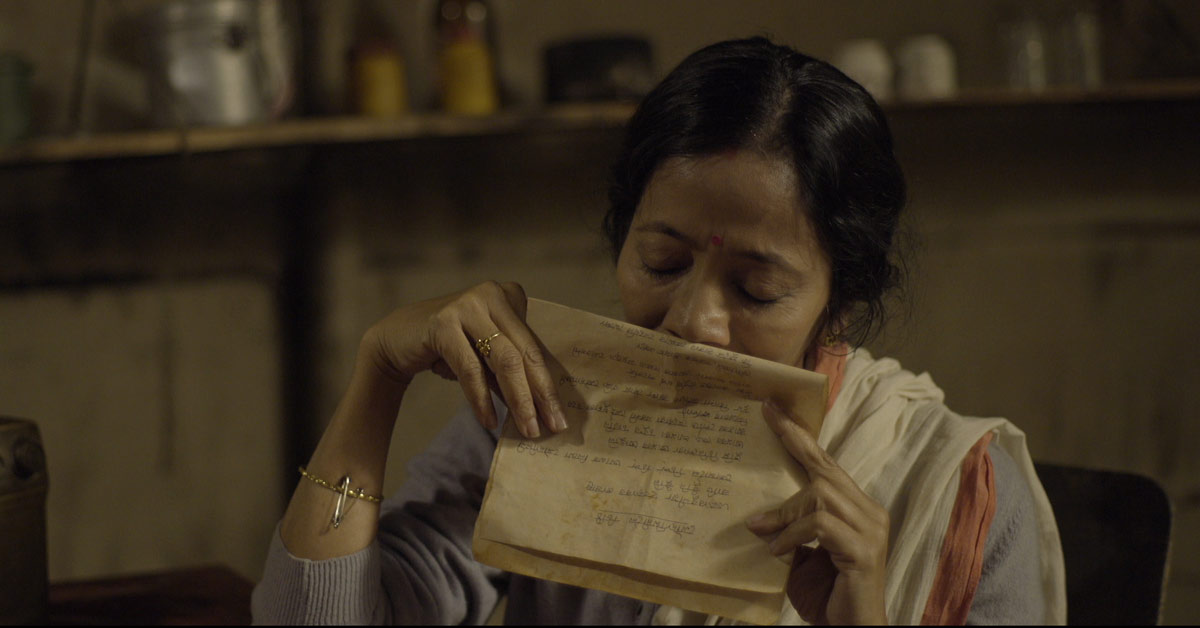
"I heard the short story of Sahitya Akademi Award-winning writer Purabi Bormudoi many years ago from a director. The innocent character of a small boy Montu from a remote village of our native place attracted me the most. Her storytelling was so vivid that after reading the story the whole scenario was portrayed in front of my eyes"
After contributing to the Assamese film industry with his expertise as an editor, it was a natural progression for Ramen Borah to turn his attention to film direction.
In 2017, his documentary Sikar Aru Sitkar (2016) received a special mention at the 64th National Film Award. His debut feature film Montur Montuh (2021) was selected at the Montreal Independent Film Festival.
In conversation with Dipankar Sarkar, the filmmaker delves deeper into his career as an artist.
Dipankar: How and why did you begin your career as a film editor?
Ramen Borah: It was quite accidental. I came to Guwahati to become a director. I also have done a two-year course on film direction at Assam Film Institute. After completing the course I met Assam's renowned editor Manash Adhikari. Under him, I learned editing. Manash Da sent me to Chennai for a postproduction work of a movie. That was the turning point for me. I came to know about editing more closely. I would like to state proudly that with Manash Adhikari leading, I and my colleagues set up the first non-linear editing set-up in the entire northeastern region at Brahmaputra Studio (Anuradha Complex). My first independently (nonlinear) edited feature film was Satyam Shivam Sundaram in the year 2003, directed by Brajen Borah at Chennai. I consider myself lucky enough because I was professionally active during the transition period of editing evolution. I have worked in celluloid as well as digital versions or I can say analogue as well as non-linear systems.
Dipankar: You have won the Best Editing in Prag Cine Award for 'Duwar' 2012. Share your experience of working with Bidyut Chakraborty?
Ramen Borah: Oh…I was very happy and delighted to receive the award as it was my first ever award. Bidyut da was a national award-winning director. Working with Bidyut Chakraborty was a very good experience for me as he was a very experienced director and dedicated to his work. He was a perfectionist. I would like to inform you that Duwar was the first movie in Assam, which was converted from celluloid to digital format.
Dipankar: How did the idea of making the documentary Sikar Aru Sitkar (2016) that deals with the brutality of poaching?
Ramen Borah: In those days, news on poaching of rhinos and elephants used to hog the media headlines constantly. Reading such news and watching the same visuals on television, I became disturbed and was shaken by the brutality. Consequently, it was the topic of our talks between friends and colleagues. My producer, Sibanu Borah, was one of them too. One night he called me up and said, `Let's do something about it' and Sikar Aru Sitkar happened.
ALSO READ | Photography From The Wild And The Urban Wild
Dipankar: Why did you decide to have a voice-over in three languages for the documentary?
Ramen Borah: From the very beginning of making Sikar Aru Sitkar, I wanted to make the subject a head-turner. I wished to reach out to everybody with a loud sigh about the cruelty to those gorgeous animals. So I thought that the language should not be a bar and did three versions of the documentary only language-wise. We prepared a lyrical script for our documentary in Hindi first, which Niloy Bhattacharya wrote. Then we approached renowned voice-over artist Jitendra Ramprakash Ji, as he is the poet himself.
Dipankar: What attracted you to the screenplay of the film Montur Montuh (2021) that you decided to make your debut?
Ramen Borah: I heard the short story of Sahitya Akademi Award-winning writer Purabi Bormudoi many years ago from a director. The innocent character of a small boy Montu from a remote village of our native place attracted me the most. Her storytelling was so vivid that after reading the story the whole scenario was portrayed in front of my eyes.

A still from Montur Montuh
Dipankar: Tell us about the casting process of the film?
Ramen Borah: The fact is that in Assam usually auditions for casting are not held by production. All I wanted was some good actors and luckily I have found them like Mandakini Goswami (Karabi), Mahendra Das (Koka/Peha).
My editing career helped me in this case. For Montu's role, I have cast my son Agnimitra. I have prepared him for the role for three years. We have done some pre-shoot and mock scenes with Mandakini and Agnimitra as tests or auditions. We took time and enough effort to choose every single character and the technician too.
Dipankar: Did your years of experience as an editor had helped you in directing the film?
Ramen Borah: Certainly it helped me in many ways. Direction, casting, and storytelling too.
Dipankar: How long did you take to finish the shooting of the film?
Ramen Borah: Montur Montoh is a very old project as I had planned for the film in 2012. But I wanted to give time to the project as it was going to be my first feature film. We prepared drafts after drafts and cancelled and the process continued over and over again. The final script was locked in 2017. The shooting began in 2019. We shot for one month and five days in the first schedule and finished the shooting part by part in one year.

A scene from the movie
Dipankar: Did the COVID-19 restrictions affect the film?
Ramen Borah: Rarely on the postproduction. We have finished shooting before the pandemic struck.
Dipankar: Any memorable moment from the shooting that you would like to share with us?
Ramen Borah: There are many but shooting in the chilling cold in a village by the mighty Brahmaputra in real-time was memorable. Can't forget Babla (the goat). We had to wait for him to get a perfect shot.
Dipankar: What are your plans for the theatrical release of the film?
Ramen Borah: We are waiting for the pandemic situation to be over. Like every filmmaker, I have the dream that my film is screened in cinema halls. Some of the OTT platforms are approaching us. We are looking for international buyers too. Let's hope for the best.
ALSO READ | Xahid Khan: Filmmaking Is An Expensive Way Of Expression
Dipankar Sarkar is a film critic who contributes to different publications- both national and international. He is a Research Fellowship from the NFAI, Pune, India, and was one of the panelists for the selection of world cinema at the 27th International Film Festival of Kerala in 2022.